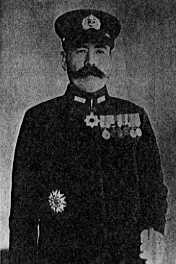Masatomi Kimura facts for kids
Quick facts for kids
Masatomi Kimura
|
|
|---|---|

Admiral Masatomi Kimura
|
|
| Born | 6 December 1891 Shizuoka, Japan |
| Died | 14 February 1960 (aged 68) Hofu, Yamaguchi Japan |
| Allegiance | |
| Service/ |
|
| Years of service | 1913–1945 |
| Rank | |
| Commands held | Maki, Asanagi, Oite, Hagi, Hokaze, Katata, Atami, Asagiri, Destroyer Group 16, Destroyer Group 21, Destroyer Group 8 Kagu Maru, Shiretoko, Jintsu, Suzuya 2nd Destroyer Squadron 1st Destroyer Squadron 3rd Destroyer Squadron |
| Battles/wars | World War II
|
| Awards | Order of the Sacred Treasure, 2nd Class Order of the Rising Sun, 3rd Class |
| Other work | Anti-Submarine Warfare School Hofu Naval Communications School |
Masatomi Kimura (木村 昌福, 6 December 1891 – 14 February 1960) was an important admiral in the Imperial Japanese Navy during World War II. He was known for his brave actions and leadership during tough battles.
Contents
Life Story of Admiral Kimura
Masatomi Kimura was born in Shizuoka city, Japan. Soon after he was born, he was adopted by a family in Tottori city. He always considered Tottori his true home.
Kimura joined the Imperial Japanese Naval Academy. He graduated in 1913. While he wasn't at the very top of his class, he worked hard.
He started his naval journey on the ship Asama. He sailed to places like Honolulu and the west coast of the United States. After returning to Japan, he served on other ships like the Yakumo.
By 1914, he became an ensign. He then served on large battleships like the Sagami and Suwo. He also studied special naval skills like torpedo warfare and naval artillery. Towards the end of World War I, he was sent to the South Pacific.
Commanding Ships and Squadrons
In 1920, Kimura became a lieutenant. He took command of many small ships, including torpedo boats and minesweepers. As he gained more experience, he was promoted to lieutenant commander in 1926. He then commanded the destroyer Maki.
Over the years, he led many different types of ships. These included destroyers like Asanagi and Asagiri. He also commanded river gunboats and even larger cruisers like the Jintsu and Suzuya. He was promoted to commander in 1932 and to captain in 1937.
World War II Service
Captain Kimura was in charge of the cruiser Suzuya when the Japanese attacked Pearl Harbor. Later, he helped rescue sailors from the cruiser Mikuma. This ship was sunk by American planes during the Battle of Midway.
In November 1942, Kimura was promoted to Rear Admiral. He then led the 3rd Destroyer Squadron.
Battle of the Bismarck Sea
In March 1943, Admiral Kimura was given a very important mission. He had to protect eight transport ships carrying 6,000 soldiers and 400 marines. They were sailing from Rabaul to Lae, New Guinea.
During the Battle of the Bismarck Sea, American and Australian planes attacked the Japanese convoy. All the transport ships and four destroyers were sunk. Admiral Kimura was injured during this battle. He was hit by machine gun fire. His flagship, Shirayuki, was also sunk. Luckily, he and most of his crew were saved by another destroyer, Shikinami.
Evacuation of Kiska
After recovering from his injuries, Admiral Kimura led the 1st Destroyer Squadron. His next big task was to help Japanese troops leave Kiska Island in the Aleutians. The weather was very bad, making the rescue difficult.
Kimura was ordered to leave, but he bravely decided to stay. He waited until every last soldier was safely rescued from the island. This showed his strong dedication to his men.
Later War Actions
In 1944, Admiral Kimura continued to lead important missions. He helped escort more troops to Leyte Island and Mindoro Island in the Philippines. In December 1944, he led a group of cruisers and destroyers. Their mission was to attack American forces on Mindoro.
On 1 April 1945, Kimura became the head of the Anti-submarine Warfare School. He also led the Hofu Naval Communications School. He was promoted to Vice Admiral in November 1945, shortly before he retired from the navy.
After the War
After World War II, Masatomi Kimura worked in the salt industry. He passed away in 1960 at the age of 68 from stomach cancer.
 | James Van Der Zee |
 | Alma Thomas |
 | Ellis Wilson |
 | Margaret Taylor-Burroughs |

